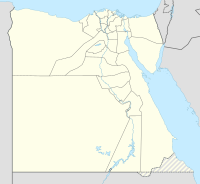Sidi Haneish Airfield
| Sidi Haneish Airfield | |
|---|---|
Haggag el Qasaba Flugplatz | |
| Coordinates |
|
| Type | Military airfield complex |
| Site information | |
| Controlled by | |
| Site history | |
| Built | 1941 |
| In use | 1941–42 |
| Battles/wars | Western Desert Campaign |
Sidi Haneish Airfield is an abandoned World War II military airfield complex in Egypt, in the western desert, about 376 km (235 miles) west-northwest of Cairo.
The airfield, known as Haggag el Qasaba by the German Luftwaffe, was the location of one of the most daring raids during World War II by the British Special Air Service (SAS). On the night of 26 July 1942, SAS Detachment "L", also known as "Stirling's Raiders", attacked the airfield, then under Luftwaffe control. Driving a convoy of eighteen jeeps, each carrying 3 or 4 British or French commandos, the raiders destroyed or damaged around forty Luftwaffe aircraft. The attack damaged the Luftwaffe's capability during the German invasion of Egypt and also, by the destruction of many transport aircraft, severely diminished its ability to re-supply German land forces in the field.[3]
The airfield was later used by the United States Army Air Force Ninth Air Force during the Eastern Desert Campaign by the British Eighth Army, which the 57th Fighter Group, flew P-40 Warhawks from 8–12 November 1942.
It was apparently abandoned after the western desert campaign moved into Libya and eventually was taken over by the desert. Aerial photos show some evidence of where it existed.
British airfields
[edit]- The LG-12 (Landing Ground) North site is given as – 31°09′0″N 027°32′0″E / 31.15000°N 27.53333°E,
- The LG-13 South is given as – 31°07′5″N 027°31′0″E / 31.11806°N 27.51667°E
- The LG-101 is given as – 31°06′0″N 027°31′0″E / 31.10000°N 27.51667°E
- The LG-102 is given as – 31°06′0″N 027°33′5″E / 31.10000°N 27.55139°E
See also
[edit]References
[edit]- ^ German map of Haggag el Qasaba East Airfield
- ^ German map of Haggag el Qasaba West Airfield
- ^ Mortimer, Gavin (2015-04-21). Stirling's Desert Triumph: The SAS Egyptian Airfield Raids 1942. Peter Dennis, Johnny Shumate, Alan Gilliland (First ed.). Osprey Publishing. ISBN 9781472807632.
![]() This article incorporates public domain material from the Air Force Historical Research Agency
This article incorporates public domain material from the Air Force Historical Research Agency
- Maurer, Maurer. Air Force Combat Units of World War II. Maxwell AFB, Alabama: Office of Air Force History, 1983. ISBN 0-89201-092-4.
- Maurer, Maurer, ed. (1982) [1969]. Combat Squadrons of the Air Force, World War II (PDF) (reprint ed.). Washington, DC: Office of Air Force History. ISBN 0-405-12194-6. LCCN 70605402. OCLC 72556.
- RAF Squadrons by C. G. Jefford. ISBN 1-84037-141-2 (page 133 airfield locations)
Further reading
[edit]- Vick, Alan (1995). Snakes in the Eagle's Nest: A History of Ground Attacks on Air Bases. Rand. p. 53. ISBN 978-0-8330-1629-4. Lists several airfields in the area.


